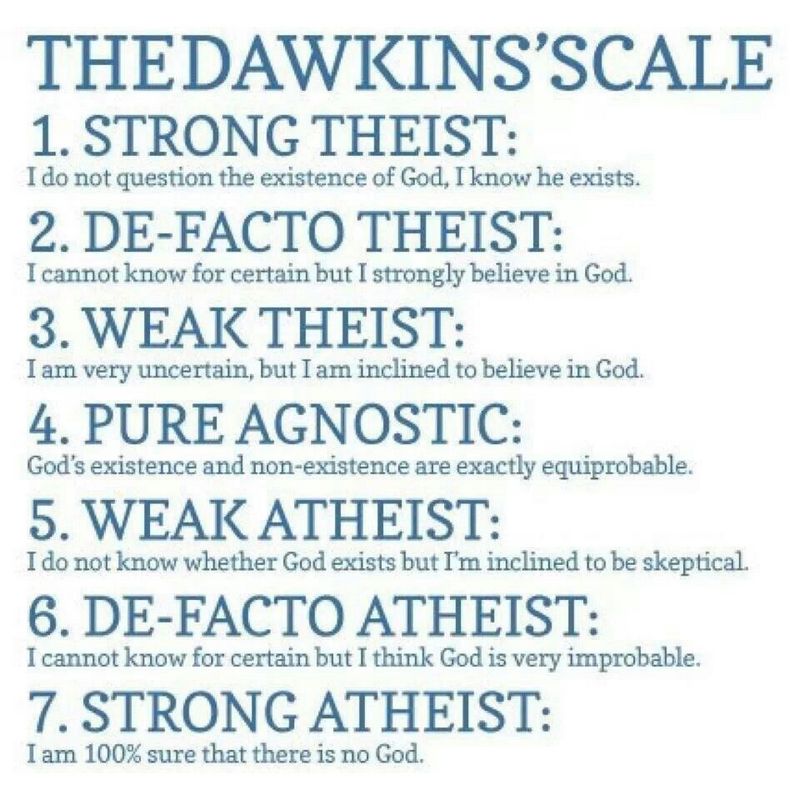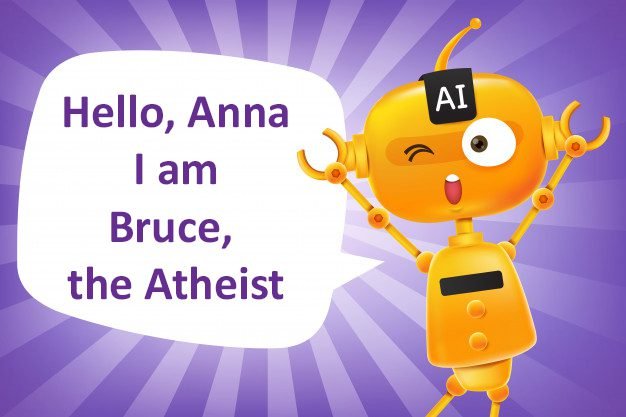
John MacFarlane is the pastor of First Baptist Church in Bryan, Ohio. First Baptist is an Independent Fundamentalist Baptist (IFB) congregation. I attended First Baptist in the 1960s and 1970s. First Baptist was my home church when I left to attend Midwestern Baptist College in Pontiac, Michigan in the fall of 1976. John, at the time, was a young boy.
I have written several posts about First Baptist Church and its present pastor, John MacFarlane:
- The Making of a Fundamentalist: First Baptist Church, Bryan, Ohio — Part One
- The Making of a Fundamentalist: First Baptist Church, Bryan, Ohio — Part Two
- Local Church Continues to Meet on Sundays Despite the Coronavirus Pandemic
Last month, MacFarlane wrote a blog post titled, When Is An Atheist Really Not An Atheist?
I do not believe that the average person claiming to be an atheist is really an atheist at all. Their venomous attacks and rantings against God, Christians, and churches betrays their heart. Let me illustrate.
There are some very interesting people out there who believe in UFOs. They believe they’ve seen UFOs hovering in the sky and that the sudden appearance of a light in the sky is the lights on their spaceship. They believe the government has covert hangers in the desert somewhere, housing their alien ships and that there are laboratories where experiments are being performed on alien bodies. There are even some who believe they have personally been abducted by aliens into their spaceships and returned.
These UFO experts are more than willing to share their story and experience with anyone who listens. They write books about it and reputable bookstore chains like Barnes & Noble or Amazon will carry them. If UFO believers find other believers out there, they quickly join forces in sharing what they “know”.
Now, I hope I’m not shocking anyone with this confession but I’m an “a-UFO-eist.” I am not a believer – in UFOs, extraterrestrials, little green men, or any such thing. There’s nothing in me that wonders, questions, ponders, or is remotely concerned that all of a sudden, E.T. is going to ride a bicycle across my night sky and want me to phone home. And, while I love a good Star Trek marathon, I have no concerns that there just might be a shred of reality to their fictional, Hollywood portrayals of life in other galaxies.
Am I bashing the UFO believers? Am I attacking them at every opportunity? Do I blog or write against them? Do I have a website dedicated to the demolition of their belief system? Is their hatred or animosity in my heart towards them? Not in the least!
Why? Because I do not believe extraterrestrials exist, therefore, there is no rhyme nor reason to rail against those who do, wasting time and precious energy.
In Psalms 14:1, David writes, “The fool hath said in his heart, There is no God…” The definition of atheism is the belief that there is no God. If a person is truly an atheist, they will live a life reflecting this. The Psalmist goes on to say, “… They are corrupt, they have done abominable works, there is none that doeth good.” The atheist will do what they want without regard to some “moral code” established by an invisible, intrusive God. They will do “that which is right in their own eyes.”
If you ask a professing atheist if there is a God, they will tell you that there is no God. But the moment that the “atheist” starts a diatribe against a God that they believe is non-existent, are they not revealing what’s really in their heart? Are they not expressing that, deep down, they know the truth? They KNOW God is real. Why else would they get all bent out of shape over something they say they do not believe really exists? The content of their heart has been exposed.
….
Rather than feeling threatened, offended, or embittered against those who would claim to be atheists and would attack us, let us look on them with love and compassion. They are fighting a battle they cannot win. Pray that God would give us a tender heart towards them and wisdom in winning them to the Lord. Be like the Apostles and continue to proclaim the Good News of Jesus Christ.
Where, oh where, do I begin? I am the most outspoken atheist in this area, and I wrote a letter to the editor of the Bryan Times which was published shortly before MacFarlane wrote his post (please see Letter to the Editor: The Rotting Corpse of American Capitalism), so I think I can safely assume that the atheist in question is yours truly. If so, why not just call me out by name? That’s exactly what I am doing in this post. When public figures make negative (and ignorant) statements about atheists, agnostics, and unbelievers, I think it is important to attach their names to said beliefs.
Out of the gate, MacFarlane says that “atheists aren’t really atheists at all.” How does he know this? Well, he doesn’t, he just believes it to be true.
In MacFarlane’s Bible-sotted mind, atheist “attacks and rantings against God, Christians, and churches betrays their heart.” MacFarlane believes we only talk about that which we believe to be true. Evidently, he’s never met any Trump supporters. They are totally disconnected from reality, yet they believe everything the president says, buying into countless conspiracy theories that are demonstratively false. I suspect MacFarlane, along with his congregation, will likely vote for Trump come November. Using the good pastor’s “logic,” I can conclude that most of his church believes things that are untrue.
MacFarlane says he doesn’t spend time talking about UFOs because he knows there’s no other life out there beside what’s on the earth created by his peculiar version of God, 6,023 years ago. He just KNOWS this to be true. As is common among Evangelicals, THE BIBLE SAYS kills scientific curiosity. It is likely there is life beyond our planet, yet MacFarlane rejects such a notion because it conflicts with his literalistic interpretation of the Protestant Christian Bible.
But, I could also say that just as MacFarlane doesn’t spend any time talking about UFOs and aliens because he KNOWS they don’t exist, I could say the same about God. I see no evidence for the existence of MacFarlane’s God, so I don’t spend any time talking about it/him/her. Wait a minute, Bruce, you talk about God all the time. Nope, my focus is on organized religion; not the said deities they worship. There is no God, so why would I waste my time talking about him? However, billions of people worship some sort of deity, be it Allah, Jehovah, or Jesus. My focus is on the beliefs and practices of believers, not God itself. (Please see Never Underestimate the Power of Jesus.)
MacFarlane believes that because I write about God, Jesus, Christianity, and the Bible, deep down in my little ‘ole heart-of-hearts, I still believe in God. I am surprised that MacFarlane doesn’t think I am still a Christian. Surely, his once-saved-always-saved soteriology demands that the unrepentant atheist Bruce Gerencser go to Heaven when he dies. Or maybe that is just a theological bridge too far for MacFarlane. Several years ago, I attended a funeral service of a family member held at First Baptist. MacFarlane did his darndest to preach the man into Heaven, all because he walked the aisle at a revival meeting as a teen. This man hadn’t attended church in 40 years. He was a misogynistic pig and a rapist. Yet, Pastor MacFarlane rolled the man right up to the pearly gates, helped him out of his wheelchair, and escorted him into Heaven. Surely, if this piece of shit made it into Heaven, I should make it too, right?
MacFarlane quotes Psalm 14:1: “The fool hath said in his heart, There is no God. They are corrupt, they have done abominable works, there is none that doeth good.” MacFarlane believes atheists and other unbelievers are:
- Fools
- Corrupt
- Do abominable works
- Do not do good
This claim, of course, is absurd. Atheists, agnostics, humanists, pagans, Buddhists, and other “unbelievers” are every bit as moral and ethical as Evangelical Christians. If MacFarlane has evidence to the contrary, he should provide it. Quoting a Bible verse doesn’t count.
MacFarlane makes an unsubstantiated moral claim:
“The atheist will do what they want without regard to some “moral code” established by an invisible, intrusive God. They will do “that which is right in their own eyes.”
MacFarlane, of course, believes morality is established and defined by the Bible God. How many times have Evangelicals used this argument? More times than I can count.
Lacking good reasons or armed with weak ones, many will object that their moral beliefs derive from their Gods. To base your ethical views on Gods you would need to know: 1) if Gods exist; 2) if they are good; 3) if they issue good commands; 4) how to find the commands; and 5) the proper version and translation of the holy books issuing commands, or the right interpretation of a revelation of the commands, or the legitimacy of a church authority issuing commands. Needless to say, it is hard, if not impossible, to know any of this.
Consider just the interpretation problem. When does a seemingly straightforward command from a holy book like, “thou shalt not kill,” apply? In self-defense? In war? Always? And to whom does it apply? To non-human animals? Intelligent aliens? Serial killers? All living things? The unborn? The brain-dead? Religious commands such as “don’t kill,” “honor thy parents,” and “don’t commit adultery” are ambiguous. Difficulties also arise if we hear voices commanding us, or if we accept an institution’s authority. Why trust the voices in our heads, or institutional authorities?
For the sake of argument though, let’s assume: that there are Gods; that you know the true one; that your God issues good commands; that you have access to those commands because you have found the right book or church, or had the right vision, or heard the right voices; and that you interpret and understand the commands correctly—even if they came from a book that has been translated from one language to another over thousands of years, or from a long-ago revelation. It is almost impossible that you are correct about all this, but for the sake of the argument let’s say that you are. However, even in this case, most philosophers would argue that you can’t base ethics on your God.
To understand why you can’t base ethics on Gods, consider the question: what is the relationship between the Gods and their commands? A classic formulation of this relationship is called the divine-command theory. According to divine command theory, things are right or wrong simply because the Gods command or forbid them. There is nothing more to morality than this. It’s like a parent who says to a child: it’s right because I say so. To see how this formulation of the relationship fails, consider a famous philosophical conundrum: “Are things right because the Gods command them, or do the Gods command them because they are right?”
If things are right simply because the Gods command them, then those commands are arbitrary. In that case, the Gods could have made their commandments backward! If divine fiat is enough to make something right, then the Gods could have commanded us to kill, lie, cheat, steal and commit adultery, and those behaviors would then be moral. But the Gods can’t make something right if it’s wrong. The Gods can’t make torturing children morally acceptable simply by divine decree, and that is the main reason why most Christian theologians reject divine command theory.
On the other hand, if the Gods command things because they are right, then there are reasons for the God’s commands. On this view, the Gods, in their infinite wisdom and benevolence, command things because they see certain commands as good for us. But if this is the case, then there is some standard, norm or criteria by which good or bad are measured which is independent of the Gods. Thus all us, religious and secular alike, should be looking for the reasons that certain behaviors should be condemned or praised. Even the thoughtful believer should engage in philosophical ethics.
So either the Gods commands are without reason and therefore arbitrary, or they are rational according to some standard. This standard—say that we would all be better off—is thus the reason we should be moral and that reason, not the Gods’ authority, is what makes something right or wrong. The same is true for a supposedly authoritative book. Something isn’t wrong simply because a book says so. There must be a reason that something is right or wrong, and if there isn’t, then the book has no moral authority on the matter.
At this point, the believer might object that the Gods have reasons for their commands, but we can’t know them. Yet if the ways of the Gods are really mysterious to us, what’s the point of religion? If you can’t know anything about the Gods or their commands, then why follow those commands, why have religion at all, why listen to the priest or preacher? If it’s all a mystery, we should remain silent or become mystics.
Several years ago, I shared my view on objective morality:
Geoff asked, What are your views on objective morality?
The question asked by Geoff is complex and filled with nuance. Anytime I have addressed morality in the past, my writing has elicited all sorts of comments from atheists and Fundamentalists alike. It seems few people like or appreciate my worldview and my understanding of morality. As a Christian, I believed that the issue of morality was settled for me: God hath spoken. Shut the hell up and do what he commands! As a dutiful follower of Jesus, I attempted to follow not only the teachings of the Bible, but the direction of Holy Spirit who lived inside of me (or so I thought at the time). Once I deconverted, I had to rethink my worldview. What was it I believed about morality in general? What was I I believed about specific moral statements and standards? My understanding of morality has evolved over the past decade. I am, in no way, a finished product. I still have many questions about morality, and it is impossible to fully answer them in a blog post.
I readily admit that Christianity has deeply affected my understanding of morality. I was in the Christian church for fifty years. I spent twenty-five of those years pastoring Evangelical churches. As a result, Evangelical morality has seeped deeply into the dark recesses of my mind. While I try to distance myself from my past, its effects linger. Thus, there are times my moral views line up with those of Christians. This doesn’t mean, then, that I am a Christian. My views also, on occasion, line up with Buddhism and other religions. All this tells me is that religions have, in the past, played a big part in the evolution of human morality.
When someone asks me whether I believe in objective morality, what I hear them asking is whether I believe there are moral standards or moral absolutes. In the strictest sense, my answer is no. Morality is always subjective. Now that doesn’t mean countries, states, and tribes can’t have absolute moral standards. They can and do. All I ask is that believers in objective morality admit that their absolutes have changed over time, and that, in fact, the changing nature of their absolutes suggests that their morality is actually subjective. For example, there is a push in the United States to make eighteen the minimum age for marriage. This law, if passed, would be considered an objective moral standard. However, in the past, people were permitted to marry as young as age thirteen, and in some countries, children are betrothed to one another when they are still primary school age. If there’s such a thing as objective morality, then shouldn’t the age for marriage have been fixed from day one? That it hasn’t been shows the subjectivity of moral beliefs.
Morality is affected by tribal, cultural, and sociological influences. This means that all morality changes with time, including absolute, never-changing, God-said-it, it’s-in-the-Bible Evangelical morality. Evangelicals now do things that were considered sins — violations of objective morality — fifty years ago. Even Independent Fundamentalist Baptist (IFB) morality continues to change and evolve. Only those who are deliberately deaf, people with fingers in their ears who say, nah, nah, nah, I can’t HEAR you, fail to see that morality is inherently subjective.
All of us belong to certain countries and tribes. As a U.S. citizen, I live in a country that supposedly values the rule of law. I say supposedly because Donald Trump’s abhorrent behavior and his penchant for ignoring the rule of law makes me question whether we indeed are still such people. Fascism is on the rise, and when it comes in full force it brings law by force, instead of WE THE PEOPLE deciding the laws that will govern us. For now, though, we are still a nation governed by laws shaped and enacted by legislators elected by voting Americans. These laws establish what we as a people believe is moral. These laws, over time, change. For example, at one time it was illegal to have an abortion; then in 1973, the U.S. Supreme Court legalized most abortions. Today, with the prospect of a right-wing Catholic being added to the Supreme Court, it is possible that laws regulating abortion will change, and women will be forced to revert to the days of coat-hanger, back alley abortions. The same can be said for much of the progress made on social and church/state issues over the past six decades. And the same can be said about slavery. There was a time when Christians believed it was permissible to own other people, and even had BIble verses they used to justify their immoral ownership of Blacks. Even worse, slaves were considered 3/5ths of a person for census purposes. This ebb and flow of moral beliefs shows that morality is subjective.
Theocrats, of course, despise the give and take of the legal process in democratic countries. They want a dictatorship, with the Christian (or Muslim) Holy book as the objective standard for morality. Theocrats demand that laws reflect their Fundamentalist interpretations of the Bible (or Koran). In their minds, their interpretations are one and the same with God’s will and commands. But, even for theocrats, their interpretations change over time, thus proving, once again, that morality is subjective.
Not only do governments establish moral norms, so do the tribes to which each of us belong. Whether at the group or family level, certain moral standards govern behavior. Now, keep in mind I am using the word moral in as broad of a way as possible. Divorce your mind from the religious constructs you have been taught, and see morality as the rules/laws/precepts by which we govern behavior. I suspect your family has certain moral standards, and those standards may or may not be different from mine. For example, I have lost readers over my refusal to stop using curse words in my writing. In their tribes, cursing is verboten or is considered in poor taste. In my tribe, it is okay to curse, except when young children are present or Polly’s IFB parents are visiting (though there have been times when a few damns, shits, and assholes have slipped out). When it is only adults in the room? Cursing is permitted, and be prepared to be schooled in sexual innuendo. Were the readers who demanded that I sanitize my writing “wrong”? Who determines what words are appropriate and what words are not? It should be clear to everyone that the words writers choose to use are subjective. Each tribe to its own.
My children are known for having what is called the Gerencser work ethic. This ethic was taught to them by their parents. Work hard. Eight hours pay for eight hours work. Do your best. Do it right the first time. Never accept good enough as a standard for acceptance. The reasons for these maxims are many, but regardless of how they came to be, they are deeply ingrained into the psyche of my adult children. My oldest son has taken one personal day at work in twenty years. His mom has taken zero. My younger children are not as zealous as their older siblings, but they still are known for being no-nonsense hard workers. This tribal ethos often brings them into conflict with other employees who have different work standards. For example, one son works in a department where the majority of the workers have already used half or more of their personal days. My wife supervises people who are already out of personal days with six months to go before they accrue new days. Years ago, my two oldest sons were asked by their fellow employees to slow down. Why? They were making less industrious employees look bad. My sons ignored their critics, choosing instead to follow the Gerencser work ethic (an ethic that can be found in many families, by the way). Both now hold management positions with their respective employers, as do their younger brother and mother. Does this make the Gerencsers better than other people? Depends on how “better” is defined, I suppose. All I know is that this very subjective work ethic is deeply embedded in my tribe. We behave this way because that what we have been taught to do.
Each of us also has personal moral standards; certain things we will and won’t do. I don’t expect other people to live by my moral standards. These rules of behavior — ever-changing — help me navigate the road of life. As a humanist, I look to the humanist ideal to provide moral guidance. This ideal, crafted by men and women, is inherently subjective, but it does address and support my worldview. I have no problem with Evangelicals wanting to live by their personal interpretations of the Bible. Go with God, I say. It is when Evangelicals demand that others live by their interpretations I have a problem.
As a post-Evangelical, I have been forced to reexamine my morality and worldview. For example, I am a pacifist. More specifically, I am a proponent of non-violent resistance. Sounds like a moral absolute, right? I would like it to be, but the world is too messy for it be so; too gray, too challenging for me to say that I am, without reservation, a pacifist. Generally, I oppose violence, yet I love and support American football — organized violence. I wouldn’t take up arms to defend the United States, but I would defend my family against attack and harm. I face this same struggle with most moral issues. It’s too easy to write Ten Commandments and say obey. I choose, instead, to think about each issue, and then come to a reasoned conclusion.
Most people agree that we should avoid harming others. I think that’s a good place to start. But, even here, it is impossible to ever live a life that does not, at some point, harm others. Take vegans. They don’t eat meat for moral reasons. They don’t want to cause animals pain and suffering. Yet, providing vegans a non-animal diet still causes pain, suffering, and death. Earthworms, insects, and other animals die so farmers can provided vegans with yummy (I am being sarcastic here) soybeans. The goal, then, should be to promote the greatest good while at the same time causing the least harm. We can then build on this foundation, asking “what is the best way for humans to govern themselves and live lives of love, peace, and harmony — pass me a joint, bro.”
Human morality is inherently subjective; a work in progress; a work that will never be completed; a work that will hopefully lead to a kinder, gentler tomorrow; a work that places great value on justice and kindness. Nirvana, it will never be, but we can have a better tomorrow if we want it badly enough. Unfortunately, internecine warfare between countries and tribes leaves me wondering if human progress is but an illusion, a pipe dream. Perhaps it is, but I see no other option than to work towards a better future for my progeny. This work requires of us hard discussions and debates about morality. Holy books or trade paperbacks are not the answer. We the people remain the captains of our ships, the masters of our destinies. God’s not coming to save us.
Now that I have dispatched with MacFarlane’s ignorant claims about atheist morality, I want to address his uninformed definition of atheism. MacFarlane defines atheism this way:
The definition of atheism is the belief that there is no God.
….
If you ask a professing atheist if there is a God, they will tell you that there is no God.
If MacFarlane had consulted God (Google), he would have learned:
Atheism is in the broadest sense an absence of belief in the existence of deities. Less broadly, atheism is a rejection of the belief that any deities exist. In an even narrower sense, atheism is specifically the position that there are no deities. Atheism is contrasted with theism, which in its most general form is the belief that at least one deity exists.
Had MacFarlane researched atheism a bit further, He would have learned about The Dawkin’s Scale:

I am an agnostic and an atheist. On the God question, I am an agnostic. I can’t know if some sort of a deity exists. The extant data tells me there is no God, and I am confident that the deities presently worshiped by humans are human creations and no gods at all. I am confident that MacFarlane’s God is a myth, that the claims made for God and Jesus are untrue. It is “possible,” but unlikely — based on probabilities — that a deity of some sort exists. Maybe we will learn one day that what we call “life” is a game simulation played by an advanced alien species, or that somewhere “out there” — right Mulder? — lives our creator, a deistic sort of God. Again, unlikely, but since I don’t possess absolute knowledge — and neither does Pastor MacFarlane — I remain agnostic on the God question.
Since it is improbable any sort of God exists, I live my day-to-day life as an atheist — as if there is no God. In fact, the only times I think about God/Jesus/Bible is when I am writing for this site. Contrary to MacFarlane’s claim, I don’t spend my waking hours raging against the Christian God and attacking Christian churches.
MacFarlane claims that the fact I talk about God is proof that I believe in said God. Really? I talk about big penises too. Trust me, all the talk in the world ain’t going to change average into John Holmes. The focus of my writing is on organized Christianity — specifically Evangelicalism and the IFB church movement. You see, what matters to me is what is done in the name of God/Jesus/Christianity. What matters to me is the damage done to our society, government, and individuals by Fundamentalist preachers who believe God talks to them and the Bible is the inspired, inerrant, infallible Word of God; preachers with theocratic tendencies who demand non-Christians bow in fealty to their God and follow their interpretations of the Bible. What matters to me is the psychological, at times, physical, harm caused by “Biblical” preaching. And finally, what matters to me is the clergy sex abuse scandal roiling over Evangelical churches: the denials, the cover-ups, the justifications.
MacFarlane implores his congregants to look on “those who claim to be atheists” (he just can’t accept people really ARE atheists) with love and compassion. You mean fake, means-to-an-end, love and compassion? No thanks. What atheists want is respect. We want the right to tell our stories and have them accepted at face value. We ask that you let atheists define atheism. We won’t decide who is and isn’t Christian, and we ask you do the same for atheists.
MacFarlane says atheists are fighting a battle they can’t win. Evidently, he is unaware of the fact that atheism and agnosticism are on the rise in the United States; that the NONES, those who are indifferent towards religion, is the fastest growing religious demographic. It seems that we are winning the battle, Pastor MacFarlane, and it is expected that the United States will become increasingly secular in the years to come.
Let me conclude this post by saying John MacFarlane and I actually have something in common: both of us are atheists. That’s right, John MacFarlane is an atheist. He, indeed, believes in the existence of the Christian God, but what about the other extant deities? MacFarlane confidently preaches that these Gods are no gods at all, that there is one true God, and his name is Jesus (actually MacFarlane is a polytheist, believing in three deities: Father, Son, and Holy Spirit). The only difference between Pastor MacFarlane and ex-pastor Bruce Gerencser is that I just believe in one less God than he does. Well, one more thing, I am more handsome too. ?
Bruce Gerencser, 68, lives in rural Northwest Ohio with his wife of 47 years. He and his wife have six grown children and sixteen grandchildren. Bruce pastored Evangelical churches for twenty-five years in Ohio, Texas, and Michigan. Bruce left the ministry in 2005, and in 2008 he left Christianity. Bruce is now a humanist and an atheist.
Your comments are welcome and appreciated. All first-time comments are moderated. Please read the commenting rules before commenting.
You can email Bruce via the Contact Form.













